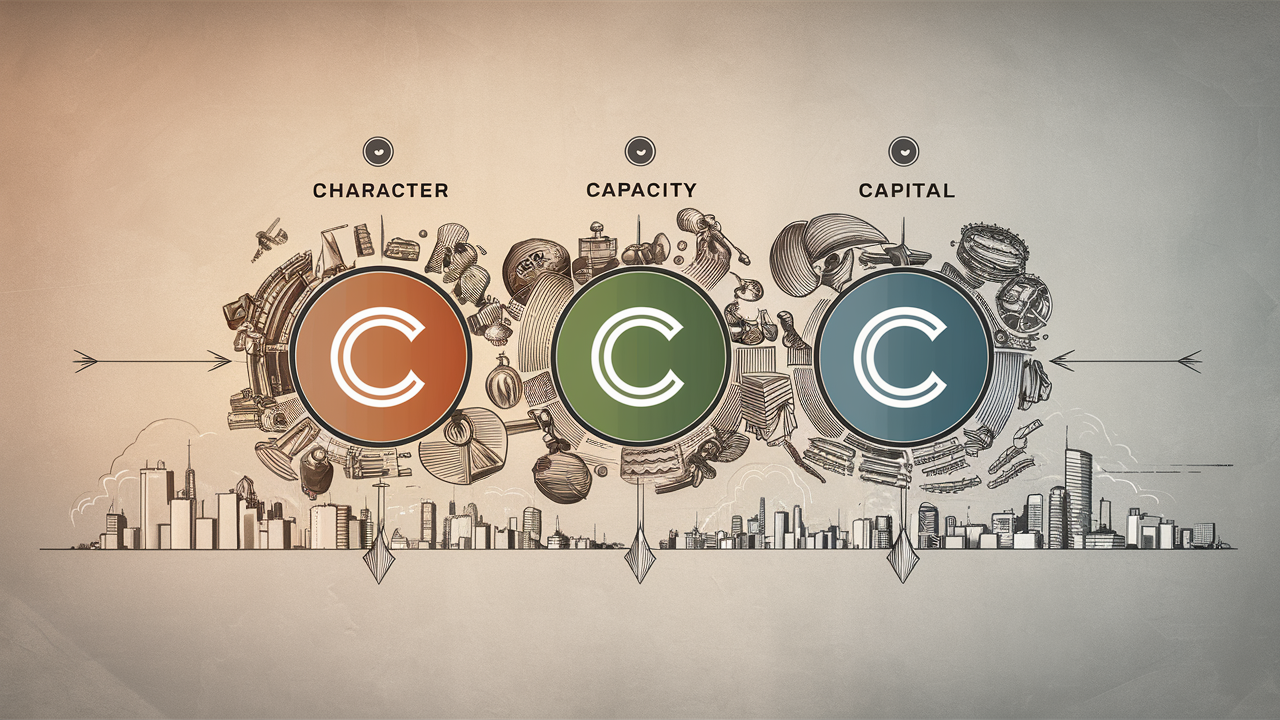When you apply for a loan, credit card, or any form of credit, lenders don't just hand out money blindly. They need to assess the risk involved – the risk that you might not pay them back. To do this, lenders use a variety of factors, but a core framework they rely on is the "Three C's of Credit": Capacity, Character, and Capital.
Understanding these three C's is crucial for anyone seeking credit. It not only helps you understand how lenders evaluate you, but also empowers you to improve your creditworthiness and increase your chances of approval.
What are the Three C's of Credit?
The three C's of credit provide a comprehensive overview of a borrower's ability and willingness to repay a debt. Let's break down each one in detail:
1. Capacity: Your Ability to Repay
Capacity refers to your ability to repay the loan. Lenders want to know if you have enough income and assets to comfortably handle the monthly payments without putting yourself in financial distress. This is perhaps the most quantifiable of the three C's.
How Lenders Assess Capacity:
- Debt-to-Income Ratio (DTI): This is the most common measure of capacity. DTI is calculated by dividing your total monthly debt payments by your gross monthly income. Lenders prefer a lower DTI, as it indicates you have more disposable income to cover loan payments. For example, a DTI of 36% or lower is generally considered good, while anything above 43% may raise concerns.
- Employment History: A stable and consistent employment history demonstrates your ability to earn a steady income. Frequent job changes can be a red flag for lenders.
- Income Stability: Lenders prefer borrowers with a stable and predictable income stream. This might involve examining pay stubs, tax returns, and other financial documents. Self-employed individuals may need to provide more extensive documentation to demonstrate consistent income.
- Existing Debt Obligations: Lenders will consider all your existing debts, including credit card balances, student loans, auto loans, and other outstanding obligations. A large amount of existing debt can significantly reduce your borrowing capacity.
- Savings and Liquid Assets: While primarily related to Capital (discussed later), having readily available cash reserves demonstrates financial responsibility and provides a safety net in case of unexpected expenses.
Improving Your Capacity:
- Reduce Your Debt: Pay down existing debts, especially high-interest credit card balances. This will lower your DTI and free up more cash flow.
- Increase Your Income: Explore opportunities to increase your income, such as a promotion, a side hustle, or a new job.
- Stabilize Your Employment: Maintain a stable employment history and avoid frequent job changes.
2. Character: Your Willingness to Repay
Character refers to your credit history and reputation as a borrower. It's about your past behavior and how reliably you've handled your financial obligations. This is often assessed through your credit report and credit score.
How Lenders Assess Character:
- Credit Report: This is a detailed record of your credit history, including your payment history, outstanding balances, credit utilization, and any negative items such as late payments, defaults, or bankruptcies. Lenders use credit reports to assess your track record of repaying debts.
- Credit Score: This is a numerical representation of your creditworthiness, based on the information in your credit report. Common credit scoring models include FICO and VantageScore. A higher credit score generally indicates a lower risk of default.
- Payment History: Your payment history is the most important factor in determining your credit score. Consistently making on-time payments is crucial for building a strong credit history.
- Length of Credit History: A longer credit history allows lenders to see how you've managed credit over time.
- Types of Credit Used: Having a mix of different types of credit (e.g., credit cards, installment loans) can demonstrate your ability to manage various types of debt. However, it's important to manage each type responsibly.
- Public Records: Lenders may also review public records for information such as bankruptcies, tax liens, or judgments, which can negatively impact your creditworthiness.
Improving Your Character:
- Pay Bills On Time: This is the single most important thing you can do to improve your credit score. Set up automatic payments to avoid missing deadlines.
- Keep Credit Utilization Low: Credit utilization is the amount of credit you're using compared to your total available credit. Aim to keep your credit utilization below 30%.
- Correct Errors on Your Credit Report: Regularly review your credit report for errors and dispute any inaccuracies you find.
- Avoid Opening Too Many New Accounts: Opening multiple new credit accounts in a short period can lower your credit score.
- Be a Responsible User of Credit: Use credit responsibly and avoid accumulating excessive debt.
3. Capital: Your Assets and Net Worth
Capital refers to your assets and net worth. It represents the financial resources you have available beyond your income to repay the loan if needed. This demonstrates your financial stability and provides a cushion in case of unexpected financial hardship.
How Lenders Assess Capital:
- Savings Accounts: The amount of money you have in savings accounts is a direct indication of your capital.
- Investments: Stocks, bonds, mutual funds, and other investments contribute to your overall net worth and demonstrate financial stability.
- Real Estate: Owning property, such as a home or investment property, represents a significant asset.
- Other Assets: Other assets, such as vehicles, jewelry, or valuable collectibles, can also be considered as part of your capital.
- Net Worth: Lenders may consider your overall net worth, which is the difference between your assets and your liabilities. A higher net worth indicates greater financial stability.
Improving Your Capital:
- Save Regularly: Make saving a priority and contribute to your savings accounts regularly.
- Invest Wisely: Invest your money in a diversified portfolio to grow your wealth over time.
- Build Equity in Your Home: Pay down your mortgage to increase your home equity.
- Avoid Spending Excessively: Practice mindful spending and avoid accumulating unnecessary debt.
Why are the Three C's Important?
The three C's of credit are important for both lenders and borrowers. For lenders, they provide a framework for assessing risk and making informed lending decisions. For borrowers, understanding the three C's empowers them to improve their creditworthiness and increase their chances of loan approval.
By understanding these principles, you can proactively manage your finances, build a strong credit profile, and achieve your financial goals. Ignoring these factors can lead to loan denials, higher interest rates, and difficulty accessing credit when you need it most.
Beyond the Three C's: Other Factors Considered
While the three C's are a fundamental framework, lenders may also consider other factors when evaluating your creditworthiness:
- The Loan Purpose: The purpose of the loan can influence the lender's assessment. For example, a loan for a home improvement project might be viewed more favorably than a loan for discretionary spending.
- Economic Conditions: General economic conditions, such as unemployment rates and interest rates, can also impact lending decisions.
- Industry Trends: Lenders may consider industry-specific trends when evaluating businesses or individuals in certain industries.
Conclusion
The three C's of credit – Capacity, Character, and Capital – provide a comprehensive framework for understanding how lenders assess your creditworthiness. By focusing on improving these three areas, you can significantly increase your chances of loan approval and secure better interest rates. Remember that building good credit is a long-term process that requires consistent effort and responsible financial management. Take the time to understand your credit profile, make timely payments, and manage your debt wisely. Your financial future depends on it.











